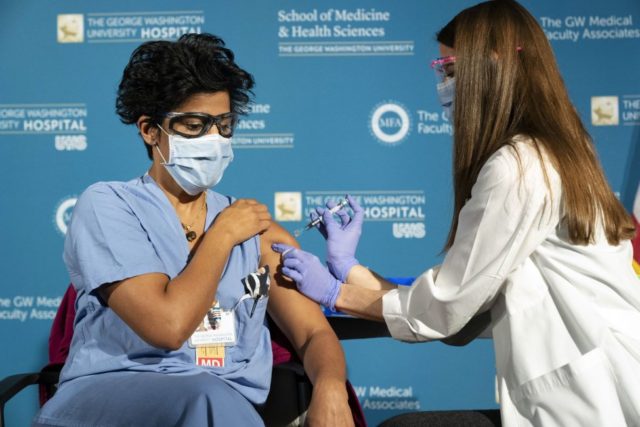Dec. 15 (UPI) — The COVID-19 vaccine manufactured by U.S. biotech firm Moderna is safe and effective enough for emergency use in the United States, scientists at the Food and Drug Administration said Tuesday.
The researchers issued their opinion in a 54-page report ahead of Thursday’s meeting of the agency’s Vaccines and Related Biological Products Advisory Committee, a group of outside medical experts who will advise FDA Commissioner Stephen Hahn on whether to approve emergency use authorization for the vaccine.
The committee and the FDA took the same steps to approve the vaccine developed by Pfizer and BioNTech last Friday and the first vaccinations were given to health workers on Monday.
“FDA has determined that [Moderna] has provided adequate information to ensure the vaccine’s quality and consistency for authorization of the product under an EUA,” the scientists wrote in their assessment of Moderna’s clinical trial data.
Moderna said last month its two-dose mRNA-1273 vaccine was more than 94% effective in preventing COVID-19 among participants in a 30,000-volunteer clinical trial. The FDA review confirmed that finding and said the vaccine is highly protective for adults and prevents severe cases of the coronavirus disease.
Like Pfizer’s, Moderna’s is a new type “messenger RNA” vaccine that uses strands of genetic material from the coronavirus to activate the body’s immune system, rather than employing a whole, deactivated virus as traditional vaccines do.
Tuesday’s FDA report came on the same day several states are planning to administer their first doses of the Pfizer-BioNTech vaccine. Thousands of additional doses will begin arriving at many U.S. hospitals.
In New York, Northwell Health, the state’s largest healthcare provider, began vaccinating hospital workers on Monday — including one of the first doses in the United States, to critical care nurse Sandra Lindsay.
Almost 40 New York City hospitals will receive their first shipments on Tuesday, city health commissioner Dr. Dave Chokshi told reporters. In total, the city expects to receive 465,000 vaccine doses within the next three weeks.
New York City has seen some of the most coronavirus cases in the United States since the start of the crisis and more than 35,000 deaths.
In California, an emergency room nurse at a Los Angeles hospital was among the first in the state to get the vaccine Monday, with Gov. Gavin Newsom by her side.
Health officials say more than 80,000 doses will arrive at centers in Los Angeles County this week.
Hospitals in several states will begin administering doses of the vaccine to health workers on Tuesday, including New Jersey, Utah, Alabama and Ohio. Several more will begin on Wednesday and Thursday.
Meanwhile, it appears more Americans are now willing to receive a coronavirus vaccine.
The COVID-19 Vaccine Monitor conducted by the Kaiser Family Foundation, said Tuesday that 71% of respondents said they “definitely” or “probably” would be inoculated — an increase from 63% in September.
The survey found that a third of respondents are enthusiastic about receiving the vaccine and another third are taking a “wait-and-see” approach. It found that 15% are opposed to a vaccine under any circumstances and 9% said they will only be inoculated if it’s required for work, school or other activities.
The KFF sad the large number of people in “wait-and-see” mode indicate that many Americans are concerned about the vaccine’s safety, but will likely change their minds once it’s shown to be safe.
The survey finds that hesitancy remains strong among Republicans, people ages 30-49, rural residents and Black adults, a group that’s been disproportionately affected by the pandemic.
Forty-two percent of Republicans and 35% of Black adults said they probably or definitely will not take the vaccine.
“Many Americans who are hesitant are simply reserving judgment before they are ready to get vaccinated,” KFF Executive Vice President Mollyann Brodie said. “However, nearly 1 in 4 Republicans don’t want to get vaccinated because they don’t believe COVID poses a serious threat.
“It will be a real challenge to undo COVID denialism among this slice of President Trump’s political base.”

COMMENTS
Please let us know if you're having issues with commenting.